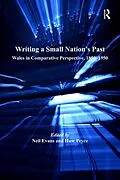This is the first volume to examine how the history of Wales was written in a period that saw the emergence of professional historiography, largely focused on the nation, across Europe and in the United States. It thus sets Wales in the context of recent work on national history writing in the nineteenth and twentieth centuries, and, more particularly, offers a Welsh perspective on the ways in which history was written in small, mainly stateless, nations. The comparative dimension is fundamental to the volume's aim, highlighting what was distinctive about Welsh historical writing and showing how the Welsh experience mirrors and illuminates broader historiographical developments. The book begins with an introduction that uses the concept of historical culture as a way of exploring the different strands of historiography covered in the collection, providing orientation to the chapters that follow. These are divided into four sections: 'Contexts and Backgrounds', 'Amateurs and Popularizers', 'Creating Academic Disciplines', and 'Comparative Perspectives'. All these themes are then drawn together in the conclusion to examine how far Welsh historians exemplify widespread trends in the writing of national history, and thereby point-up common themes that emerge from the volume and clarify its broader significance for students of historiography.
Autorentext
Neil Evans, Cardiff University, UK and Huw Pryce, Bangor University, UK.
Zusammenfassung
Traditionally, developmental psychology has its focus on individuals. Developmentalists aim to describe regularities in individuals' change and development across time, to explain the processes and mechanisms that are involved in producing change and regularity, and eventually, to design strategies for optimization and modification of developmental pathways. Although the role of contexts has always been of central concern for these purposes, it is nevertheless quite surprising to note that compared to the effort devoted to individuals, relatively little attention has been paid to the study of the nature and organization of their contexts. This volume is an exploration of the idea that how we describe and explain human development will be closely tied to our understanding of what contexts are, how individuals and contexts become influential for one another, what contexts do to and with individuals, and how contexts and their influences change themselves across time. A major theme is whether the traditional dichotomy between individuals and their contexts may be artificial, perhaps culturally biased, and after psychologists have adhered to it for about a century, may have become an impediment to increasing our understanding of developmental processes. With this volume, the editors contribute a serious consideration of development and systematic change to emerging models of person-context relations, and provide suggestions about how it may be possible to incorporate these notions in developmental research and theorizing.
Inhalt
Contents: Preface; Part 1 Contexts and Backgrounds: Writing a small nation's past: states, race and historical culture, Neil Evans and Huw Pryce; National historiography, 1850-1950: the European context, R.J.W. Evans; J.E. Lloyd's History of Wales (1911): publication and reception, Huw Pryce. Part 2 Amateurs and Popularizers: Failed founding fathers and abandoned sources: Edward Williams, Thomas Stephens and the young J.E. Lloyd, Marion Löffler; 'An account obtained from authentic documents': Jane Williams (Ysgafell) as a historian, Gwyneth Tyson Roberts; A nation of nonconformists: Thomas Rees (1815-85) and nonconformist history, Prys Morgan; Outlaw historian: Owen Rhiscomyl and popular history in Edwardian Wales, John S. Ellis; 'A refreshingly new and challenging voice': O.M. Edwards's interpretation of the Welsh past, Lowri Angharad Hughes Ahronson. Part 3 Creating Academic Disciplines: From antiquarians to archaeologists in 19th-century Wales: the question of prehistory, Nancy Edwards and John Gould; John Rhs, Celtic studies and the Welsh past, T.M. Charles-Edwards; The institutionalization of history in the University Colleges of Wales, 1880-1939: Aberystwyth and Bangor, Peter Lambert; Venturing into the 'jungle': late medieval Wales in the Edwardian age, Ralph A. Griffiths; Town and nation: writing urban histories in 19th- and early 20th-century Wales, Paul O'Leary; Beyond 1282: A.H. Dodd and the problem of modern Welsh history, Neil Evans. Part 4 Comparative Perspectives: The fall of Rome and its aftermath from the 18th to the early 20th centuries, Ian Wood; History and the historians of medieval Catalonia in the late 19th and early 20th centuries, Adam J. Kosto; A forgotten anniversary: P. Hume Brown's History of Scotland, 1911, Dauvit Broun; Robert Dudley Edwards and the uses of Catholic nationalism, Ciaran Brady; Conclusion: Welsh national history and its European context, Stefan Berger; Bibliography; Index.
